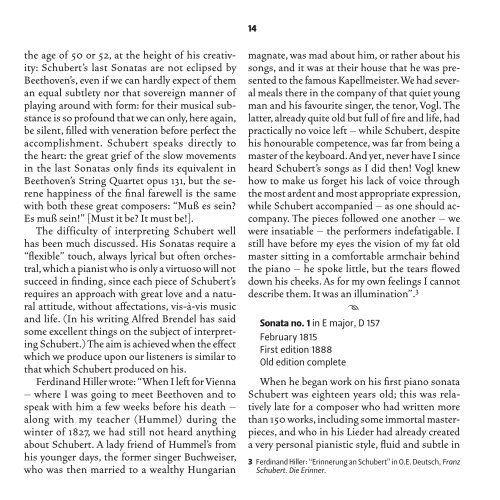Télécharger le livret - Outhere
Télécharger le livret - Outhere
Télécharger le livret - Outhere
Create successful ePaper yourself
Turn your PDF publications into a flip-book with our unique Google optimized e-Paper software.
the age of 50 or 52, at the height of his creativity:<br />
Schubert’s last Sonatas are not eclipsed by<br />
Beethoven’s, even if we can hardly expect of them<br />
an equal subt<strong>le</strong>ty nor that sovereign manner of<br />
playing around with form: for their musical substance<br />
is so profound that we can only, here again,<br />
be si<strong>le</strong>nt, fil<strong>le</strong>d with veneration before perfect the<br />
accomplishment. Schubert speaks directly to<br />
the heart: the great grief of the slow movements<br />
in the last Sonatas only finds its equiva<strong>le</strong>nt in<br />
Beethoven’s String Quartet opus 131, but the serene<br />
happiness of the final farewell is the same<br />
with both these great composers: “Muß es sein?<br />
Es muß sein!” [Must it be? it must be!].<br />
The difficulty of interpreting Schubert well<br />
has been much discussed. His Sonatas require a<br />
“f<strong>le</strong>xib<strong>le</strong>” touch, always lyrical but often orchestral,<br />
which a pianist who is only a virtuoso will not<br />
succeed in finding, since each piece of Schubert’s<br />
requires an approach with great love and a natural<br />
attitude, without affectations, vis-à-vis music<br />
and life. (in his writing Alfred Brendel has said<br />
some excel<strong>le</strong>nt things on the subject of interpreting<br />
Schubert.) The aim is achieved when the effect<br />
which we produce upon our listeners is similar to<br />
that which Schubert produced on his.<br />
Ferdinand Hil<strong>le</strong>r wrote: “When i <strong>le</strong>ft for Vienna<br />
– where i was going to meet Beethoven and to<br />
speak with him a few weeks before his death –<br />
along with my teacher (Hummel) during the<br />
winter of 1827, we had still not heard anything<br />
about Schubert. A lady friend of Hummel’s from<br />
his younger days, the former singer Buchweiser,<br />
who was then married to a wealthy Hungarian<br />
14<br />
magnate, was mad about him, or rather about his<br />
songs, and it was at their house that he was presented<br />
to the famous Kapellmeister. We had several<br />
meals there in the company of that quiet young<br />
man and his favourite singer, the tenor, Vogl. The<br />
latter, already quite old but full of fire and life, had<br />
practically no voice <strong>le</strong>ft – whi<strong>le</strong> Schubert, despite<br />
his honourab<strong>le</strong> competence, was far from being a<br />
master of the keyboard. And yet, never have i since<br />
heard Schubert’s songs as i did then! Vogl knew<br />
how to make us forget his lack of voice through<br />
the most ardent and most appropriate expression,<br />
whi<strong>le</strong> Schubert accompanied – as one should accompany.<br />
The pieces followed one another – we<br />
were insatiab<strong>le</strong> – the performers indefatigab<strong>le</strong>. i<br />
still have before my eyes the vision of my fat old<br />
master sitting in a comfortab<strong>le</strong> armchair behind<br />
the piano – he spoke litt<strong>le</strong>, but the tears flowed<br />
down his cheeks. As for my own feelings i cannot<br />
describe them. it was an illumination”. 3<br />
∆<br />
Sonata no. 1 in E major, D 157<br />
February 1815<br />
First edition 1888<br />
Old edition comp<strong>le</strong>te<br />
When he began work on his first piano sonata<br />
Schubert was eighteen years old; this was relatively<br />
late for a composer who had written more<br />
than 150 works, including some immortal masterpieces,<br />
and who in his Lieder had already created<br />
a very personal pianistic sty<strong>le</strong>, fluid and subt<strong>le</strong> in<br />
3 Ferdinand Hil<strong>le</strong>r: “Erinnerung an Schubert” in O.E. Deutsch, Franz<br />
Schubert. Die Erinner.


